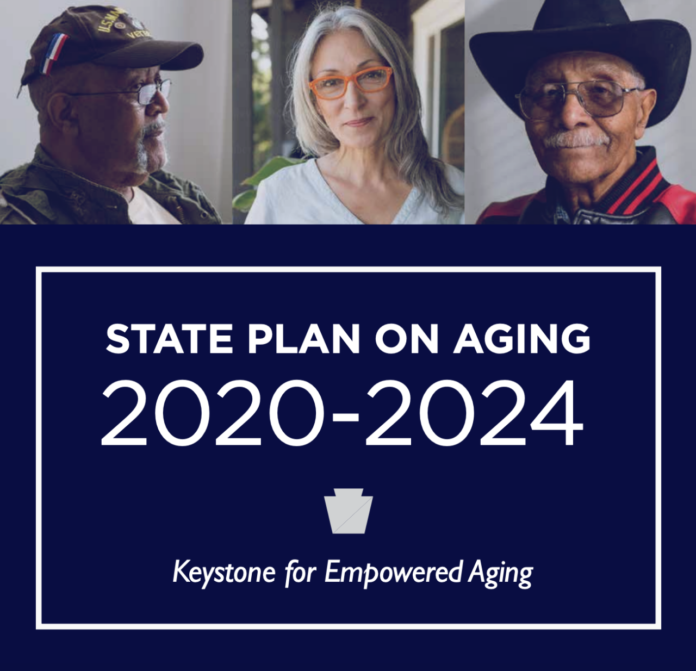Every four years, the Pennsylvania Department of Aging is required to submit a State Plan on Aging to the federal government outlining its vision for the delivery of aging services statewide. This document provides a blueprint for service delivery, strategic priorities, and measurable goals for the next four years.
In 2016, despite the impassioned advocacy of community members and LGBTQ-serving organizations, the Pennsylvania State Plan on Aging published for 2016-2020 did not include any language about the needs of LGBTQ older Pennsylvanians. It was much the same spectacle in 2012 when that year’s State Plan failed to make any mention of LGBTQ people or steps to better serve our communities.
But the 2020-2024 Pennsylvania State Plan on Aging, which was formally submitted to the federal government last month by Secretary of Aging Robert Torres, blazes a new trail in its commitment to LGBTQ Pennsylvanians. The State Plan for 2020-2024 lays out one of the most progressive and LGBTQ-friendly agendas in the nation. It sets measurable goals for trainings within the provider network, the collection of data on sexual orientation and gender identity, outreach into LGBTQ communities, and strengthening partnerships with LGBTQ-serving organizations.
Many of us who work in the field of aging and who advocate for LGBTQ elders have long targeted this State Plan as an opportunity to influence the LGBTQ inclusivity of the aging services network in Pennsylvania. The newly released plan for 2020-2024 finally gives prominent standing to LGBTQ aging issues and commits to addressing needs facing LGBTQ elders across the Commonwealth.
The following are a few of the highlights of the Pennsylvania 2020-2024 State Plan on Aging.
Training a culturally sensitive aging network
The fear of being mistreated or discriminated against causes many LGBTQ elders to delay seeking care or to forgo services that could help them to age in their homes and communities. Improving the cultural sensitivity of the provider network is an essential step to assure that LGBTQ people have access to professional services that are inclusive and affirming.

The Department of Aging has already received a “Platinum Certification” from the organization SAGE for completing LGBTQ cultural competency trainings over the past two years. The State Plan commits to maintaining this certification and ensuring that its 52 Area Agencies on Aging (AAA) – the county-level agencies administering aging services at the local level – also complete these trainings and certification process. This would make Pennsylvania the first state nationally to achieve this level of training with its Department of Aging and its AAAs!
Connecting LGBTQ communities and the Department of Aging
The Department of Aging oversees several vital services including meal programs, protective services, transportation, health and wellness programs, the ombudsman program, and prescription assistance. The State Plan identifies the importance of being proactive in reaching out to LGBTQ communities to connect individuals with these resources.
The State Plan sets strategic goals for conducting outreach in LGBTQ communities and partnering with LGBTQ-serving organizations. Specific outcomes identified in the State Plan include enrolling more LGBTQ seniors into prescription assistance programs, connecting LGBTQ people to mental health resources, and recruiting LGBTQ volunteers for the ombudsman program as advocates for individuals in long-term care settings.
Collecting sexual orientation and gender identity (SOGI) data
To date, state agencies in Pennsylvania have not had an adequate method for collecting data on how LGBTQ people are utilizing services. Most intake forms and assessments simply do not ask about sexual orientation. When gender data is collected, it most often only gives options of male or female. There is therefore no means of knowing how LGBTQ people are accessing services or if these services are effective.
The State Plan commits to developing and implementing a method to collect SOGI data within its data collection systems, prioritizing that this be completed by October 2021. Given the goals laid out in this plan related to engagement with LGBTQ communities, the state must be able to measure its effectiveness in reaching LGBTQ people and to use data to identify any gaps in services.
2020 has been short on good news when it comes to politics (or maybe any kind of good news!). Yet, we should recognize this State Plan on Aging as a success that is going to positively impact our communities. The steps that will be taken over the next four years will continue to push Pennsylvania forward as a good place to grow older for LGBTQ people.
The complete State Plan on Aging is available at aging.pa.gov.
